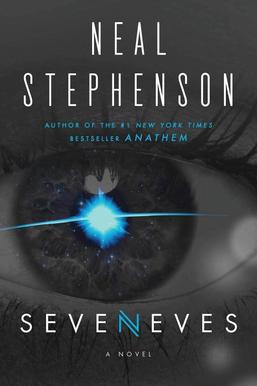SevenEves Neal Stephenson
ISBN: 0062190377 
To glance around the internet is to discover that highly influential people love Seveneves, by Neal Stephenson. Of course, if one pays careful attention, one also notices an undercurrent of something that one does not typically see when one thinks of Stephenson and his fan base–disappointment.
When one embarks upon an epic Sci-Fi novel like Seveneves, there is a definite “warm up” period that one has to observe while the world is being steadily constructed with descriptions and characters. The first half of the book offers quite a lot of build, although the central event–that of the moon blowing up–is never really “answered.” It is more of a existential moon that blows up, and then everyone has to deal with the fall out of its explosion. It is a curious omission that the moon just “explodes” and we never especially learn why. For a Sci-Fi book, not explaining a scientific why to an event is a little like writing a murder mystery with no killer. It is an annoying omission.
The first of the rest half of the book, though, does a reasonably good job explaining the political fallout and various strategies adopted due to this mysterious calamity that is sure to cause a “Fiery rain of rocks” upon the face of the Earth. A lot of creative physics solutions are built into the reading and we see the beginning of a kind of “Space Earth Savagery” begin to unfold where a Darwinian mode of existence is imposed along with the potential for genetic editing to produce certain kinds of characteristics in offspring.
After all this excitement, we flash forward to the future and everything is well–boring. To be sure, there are some unique conceptions of space stations and how they are built along with the mechanics of how certain space suits work and how social stratification has occurred along genetic lineages, but all in all there really is not too much to get excited about until, surprise, the semi-space people discover that the people who stayed on Earth did not all perish in the raining down and subsequent destruction caused by all the moon debris. Needless to say, these survivors are “somewhat pissed” at those who shot off into space and now are trying to return to the surface of the Earth they left.
This, of course, is the prelude to an inter-tribal civil war over the Earth split between the “Red Group”, and the “Blue Group”–like some kind of Planet of the Apes redux. The ending rather trails off along these lines, leaving the possibility of an equally boring sequel, open. One can certainly visualize another agonizing 880 pages titled something clever like “Red Shift” or “Blue Shift.” Wait, the video game series Half-Life all ready beat everybody to that. In fact, the writing in Half-Life is actually much better than that in Seveneves. The mysteries that go unanswered there at least make sense.
Of course, if you happen to be Bill Gates, this book is the best thing ever since it is some kind of wish fulfillment of semi-alien-tech-cyborg-billionaire entrepreneurs. One gets the feeling though that Gates has missed the memo on this being science FICTION and not “something Bill Gates should spend billions on” trying to bring into this world…
Put bluntly, if you have ever seen any Sci-Fi or read any Sci-Fi ever, then Seveneves has nothing to offer you that you have not seen before, and instead presents the chance to be annoyed by what it lacks. It is better to take a hard pass on this one unless you are just a Stephenson fan that wants a complete body of work. While the first half is fairly well done, the second half is more of an exercise in the abilities of tolerance and discipline. The riveting conclusion, civil war being imminent between two dystopian future lineages, is standard Sci-Fi procedure with no conclusion. Who cares?
